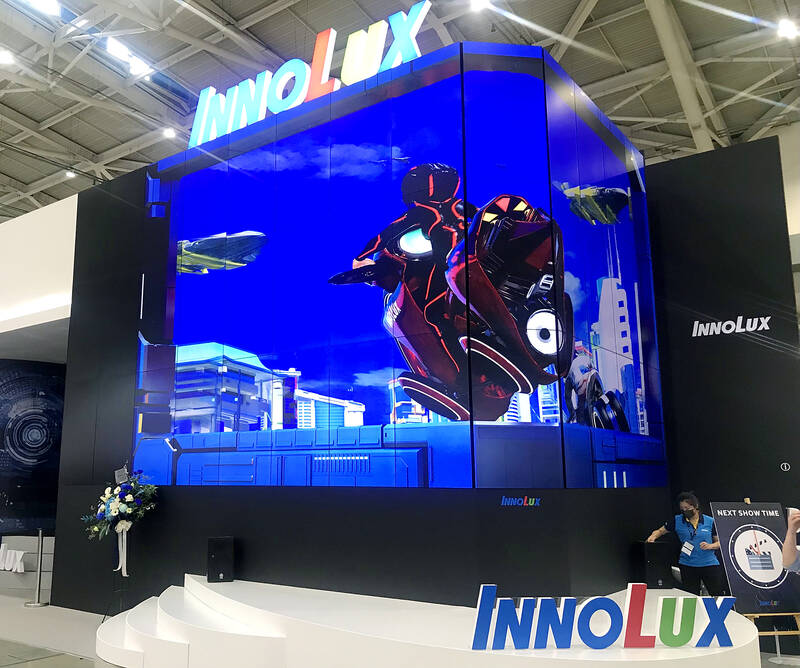Innolux Corp (群創) is deepening its partnership with the US-based Corning Inc in the production of cockpit displays through a subsidiary, as it pushes ahead with transformation efforts to fuel growth.
Singapore-based CarUX Technology Pte Ltd (群豐駿科技), a vehicle display maker fully owned by Innolux, would incorporate Corning’s cold-bending technology into its large curved vehicle displays, Innolux said in a statement yesterday.
CarUX and Corning are expanding their collaboration from automotive glass substrates to glass substrate protection solutions, as they seek to build supply chain ecosystems to generate greater industrial synergies, CarUX said in the statement.

Photo: Chen Mei-ying, Taipei Times
With Corning’s ColdForm technology, a glass cover can be seamlessly fitted on a vehicle display, providing more innovative and diversified displays, the statement said.
The cover also creates a safer driving environment, it said.
CarUX counts General Motors Co among its major customers.
The automaker in March honored CarUX with the Override Award in recognition of its strategy for large information displays, Innolux said.
CarUX established local units in Tainan and Hsinchu in January.
Innolux last month said that it is branching out to displays with better profit margins and durability, and is seeking less volatile markets.
Innolux is targeting vehicle displays, especially those used in autonomous vehicles, head-up displays, cluster displays and center information displays (CIDs), it said.
With the size of vehicle displays increasing, CarUX focuses on supplying 20-inch or larger CIDs with higher price margins than TVs or computer displays, Innolux told investors last month.
Innolux said it aims to boost revenue contribution from vehicle displays to 50 percent of overall revenue, from about 12 percent in the second quarter.
Vehicle displays made up less than 7 percent of the company’s overall revenue two years ago.
The segment caters to a niche sector that offers a buffer against slumps in the TV and PC display markets, it said.

Three experts in the high technology industry have said that US President Donald Trump’s pledge to impose higher tariffs on Taiwanese semiconductors is part of an effort to force Taiwan Semiconductor Manufacturing Co (TSMC, 台積電) to the negotiating table. In a speech to Republicans on Jan. 27, Trump said he intends to impose tariffs on Taiwan to bring chip production to the US. “The incentive is going to be they’re not going to want to pay a 25, 50 or even a 100 percent tax,” he said. Darson Chiu (邱達生), an economics professor at Taichung-based Tunghai University and director-general of

Hon Hai Precision Industry Co (鴻海精密) is reportedly making another pass at Nissan Motor Co, as the Japanese automaker's tie-up with Honda Motor Co falls apart. Nissan shares rose as much as 6 percent after Taiwan’s Central News Agency reported that Hon Hai chairman Young Liu (劉揚偉) instructed former Nissan executive Jun Seki to connect with French carmaker Renault SA, which holds about 36 percent of Nissan’s stock. Hon Hai, the Taiwanese iPhone-maker also known as Foxconn Technology Group (富士康科技集團), was exploring an investment or buyout of Nissan last year, but backed off in December after the Japanese carmaker penned a deal

WASHINGTON POLICY: Tariffs of 10 percent or more and other new costs are tipped to hit shipments of small parcels, cutting export growth by 1.3 percentage points The decision by US President Donald Trump to ban Chinese companies from using a US tariff loophole would hit tens of billions of dollars of trade and reduce China’s economic growth this year, according to new estimates by economists at Nomura Holdings Inc. According to Nomura’s estimates, last year companies such as Shein (希音) and PDD Holdings Inc’s (拼多多控股) Temu shipped US$46 billion of small parcels to the US to take advantage of the rule that allows items with a declared value under US$800 to enter the US tariff-free. Tariffs of 10 percent or more and other new costs would slash such

SENSOR BUSINESS: The Taiwanese company said that a public tender offer would begin on May 7 through its wholly owned subsidiary Yageo Electronics Japan Yageo Corp (國巨), one of the world’s top three suppliers of passive components, yesterday said it is to launch a tender offer to fully acquire Japan’s Shibaura Electronics Co for up to ¥65.57 billion (US$429.37 million), with an aim to expand its sensor business. The tender offer would be a crucial step for the company to expand its sensor business, Yageo said. Shibaura Electronics is the world’s largest supplier of thermistors, with a market share of 13 percent, research conducted in 2022 by the Japanese firm showed. If a deal goes ahead, it would be the second acquisition of a sensor business since